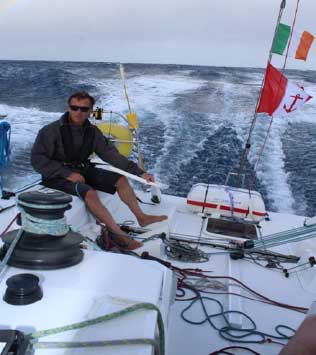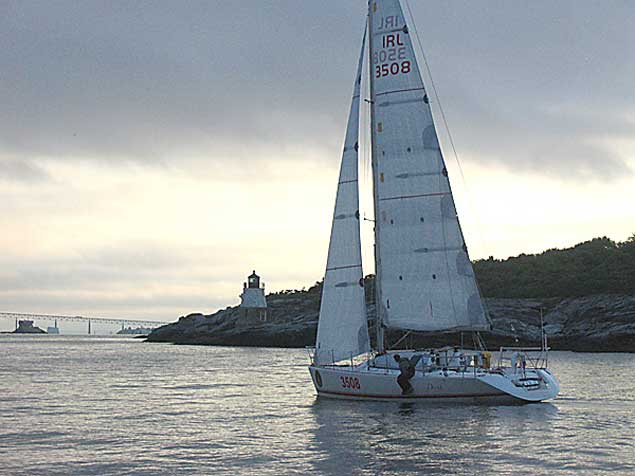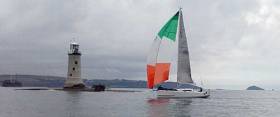Displaying items by tag: Original Solo Transatlantic Race
Howth Yacht Club's Conor Fogerty Prepares For Ostar Race 2017
This month sees Conor Fogerty of Howth Yacht Club, preparing for one of the most prestigious and demanding solo ocean races in the international yachting calendar.
The latest instalment of the OSTAR (Original Solo Transatlantic Race), commences on 29th May 2017.
This will see Fogerty, bring his much loved and widely campaigned Sunfast 3600 'Bam', to the start line off Plymouth Sound in the English Channel. This gruelling race which is taxing on both body and mind, heads across the North Atlantic Ocean, to Newport Rhode Island, over 3,000 miles of Ocean.
Although the race name OSTAR may trip easily off the tongue, this generally upwind race, is not for the faint hearted or indeed occasional offshore adventurer.
 Fogerty and Bam surfing at 20–knots during a 2016 transatlantic crossing
Fogerty and Bam surfing at 20–knots during a 2016 transatlantic crossing
The event sees the solo skippers pit themselves against strong gales and big seas as a matter of course, not to mention, ice, fog, shipping and the occasional whale attack is not unknown.
He will follow in the footsteps of a veritable who’s who of sailing greats and pioneers of ocean racing. The names of Chichester, Knox Johnson, Blyth, Tabarly, Peyron, not forgetting Ellen McArthur are some of those who have sailed this great race before him.
In an Irish context, solo sailor Barry Hurley of the Royal Irish Yacht Club took a class win in the 2009 Ostar after a 21–day match race with an Italian competitor.
OSTAR history can be traced to an English war veteran Blondie Hassler who set about organising the race in 1956 and saw it first run in 1960 under the guidance of The Royal Western Yacht Club. From those early days of sextants and hand bearing compasses, the race has witnessed the trialling of most major innovations in boat design and on board equipment common in modern day sailing. This includes the advent of multi hulls, autopilots, water ballast, GPS, and weather routing. Whilst all of the above have certainly revolutionised sailing for the modern day solo adventurer, they do little to diminish the stark reality of dealing with the conditions, the low pressure systems of the North Atlantic create.
 After 21 days at sea Barry Hurley makes a dawn finish and a class win in the 2009 Ostar
After 21 days at sea Barry Hurley makes a dawn finish and a class win in the 2009 Ostar
Conor is a seasoned campaigner. Last year alone saw his 11–metre Bam start the year with a win in the RORC Caribbean 600. From there a 16–day solo trip to the Azores and then after some much needed R &R in Horta, back to Ireland.
Next up were the ISORA races across the Irish Sea and forays to the South Coast of England and North of France competing in RORC races. Not forgetting a 3rd place finish in the Round Ireland and a Solo Fastnet (SORC) challenge, which but for a fickle wind at the end line, would have seen him claim the top of the podium. The season came down with the Middle Sea Race off Malta which saw Fogerty and Bam claim the 3rd overall in class for the RORC 2016 season.
This was a fitting reward for skipper and crew for the thousands of hard miles campaigning in 2016, without the big budgets of some competitors or indeed sponsorship.
It has been said that the major achievement racing the OSTAR is to get the boat to the start line.
These campaigns do not come easily or cheaply to the racing privateer. The aim now is to get as many sponsors as possible on board, to back this commendable Corinthian challenge.
Conor is in discussions with potential sponsors at the moment, but he also provides a grass route sponsorship option for an individual to have their name displayed on the hull to show support, and to give his attempt every chance of success, and to fly the Irish flag with distinction. If you are interested in providing support, please contact [email protected]





























































